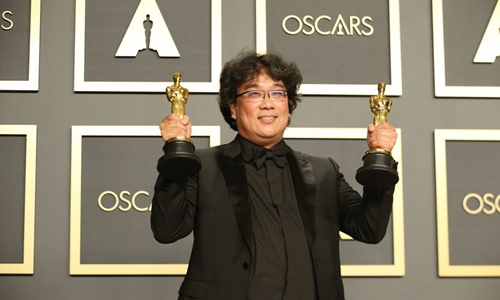HOME >> OPINION
Parasite marks a Hollywood milestone on long road to equality
By Rong Xiaoqing Source:Global Times Published: 2020/2/21 17:58:40

Bong Joon-ho poses for photos at the 92nd Academy Awards ceremony at the Dolby Theatre in Los Angeles, the United States, February 9, 2020. Photo: Xinhua
The bloody, comic thriller Parasite, by Director Bong Joon-ho, wasn't my favorite movie from last year, but when Bong and his crew went on stage to receive his Oscar for best picture on February 9, I knew I was witnessing one of the best moments in the history of the Academy Awards.
The golden glow from the Oscar statuette, the world's most coveted trophy for people in the film industry, has been dulled in recent years by the underrepresentation of people of color. This year was no different. It was summed up by a headline in an editorial in the Los Angeles Times published after the nominees were announced in January; "The Oscars are still so white. And male."
While the category Best Foreign Film was added to the Oscars in 1956, Hollywood has never been a big fan of foreign productions.
But progress has been clearly made. The stark contrast was caught by the Hollywood Reporter's columnist Scott Feinberg in his coverage of this year's ceremony: "...in 1949, when the British film Hamlet became the first non-American best picture Oscar winner, gasps and boos were audible in the room. But in 2020, when the Korean film Parasite became the first non-English-language best picture Oscar winner, Hollywood's elite stood on their feet and enthusiastically applauded."
Parasite's win was a clear milestone. It not only received the most votes from academy members but it won over industry sentiment.
Bong's acceptance speeches - he also received best foreign film and best director awards made the night even more exciting. He paid homage to Martin Scorsese, saluted Quentin Tarantino, shared the spotlight with his team members, and, best of all, made his speeches in the Korean language.
The non-English speech was too much for Blaze TV host Jon Miller. The conservative TV personality lashed out on Twitter on Oscar night: "A man named Bong Joon Ho wins #Oscar for best original screenplay over Once Upon a Time in Hollywood and 1917. Acceptance speech was: "GREAT HONOR. THANK YOU." Then he proceeds to give the rest of his speech in Korean. These people are the destruction of America."
At first, Miller's venom made me laugh because of its idiotic logic. This was not about foreigners invading the stage preserved for American stars. Bong has had little to do with the US. He was born in South Korea, grew up in South Korea, studied filmmaking in South Korea, and made most of his films in South Korea and in the Korean language. Why would anyone expect him to speak any language other than Korean?
When I thought through the question, I started to feel very uncomfortable. By using the words "these people," Miller mixed Bong and his crew with people like me - immigrants who live in the US - and inadvertently revealed a disturbing undercurrent that is once again on the rise in this country's psyche.
There is no law requiring immigrants speak English. But those who don't have long been ridiculed. This is so ingrained in the culture that Piers Morgan, the British TV host, allowed himself to mock the Chinese language with nonsense mimicking; "Ching chang cho jo," he said in a recent broadcast.
The stigma was so heavy in the 1960s, that many Chinese immigrants deliberately steered their children away from learning the Chinese language in the hope they will be accepted by so-called mainstream society. That changed when an influx of immigrants and the civil rights movement boosted minorities' sense of pride in their heritage and a greater tolerance of diverse cultures developed in American society.
In recent years, first and second generation immigrant Hollywood stars including Ang Lee, Sandra Oh and Awkwafina all have spoken in their native languages during their acceptance speeches for major awards. It shows their respect for the culture which obviously means a lot to them. It has also helped build international media coverage of the awards, which in turn has built international interest.
In his acceptance speech at the Golden Globes, at which Parasite won the Best Foreign Film award, Bong said in Korean; "Once you overcome the one-inch tall barrier of subtitles, you will be introduced to many more amazing films."
This logic can also apply to negative view of immigrants who speak a language other than English - once you overcome the language chauvinism, you'll find they are major contributors to life and work in the US.
Yet "speak English only" signs popping up in shops and restaurants in some areas amid the Trump administration's hostile policies toward immigrants and the more than 30,000 "likes" Miller's brainless tweet received show that day is still far off.
The author is a New York-based journalist and Alicia Patterson fellow. rong_xiaoqing@hotmail.com
Posted in: VIEWPOINT